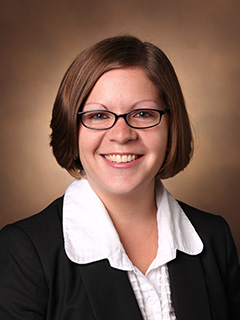2014 New Century Scholars Doctoral Scholarship, 2015 Research Travel Grant
The Best of Worlds

For a PhD student at Vanderbilt University investigating mechanisms that underlie vocal fold wound healing to the end of better understanding how to treat individuals with voice disorders, Carolyn Novaleski has the best of academic worlds—her doctoral work is in the Department of Hearing and Speech Sciences but her advisor Bernard Rousseau is in the Department of Otolaryngology. For Novaleski’s work it’s a union made in research heaven.
Novaleski, more specifically, is studying apoptotic cell death in epithelial tissue of the vocal folds. “In particular,” she says, “I am interested in understanding how cells die in the vocal folds in response to trauma so that ultimately we can help prevent damage or, where there is damage, offer better treatment.” At present, we know very little about what happens to vocal fold tissue at the histological level, Novaleski explains, “So we are at a primitive stage in our research and understanding of how this process works. We need to pursue basic science experiments to build more of a foundation to prevent and manage voice disorders.”
Voice disorders can significantly reduce individuals’ quality of life. An impairment in the ability to communicate may have a serious psychological dimension but it can be especially detrimental to people who rely on their voices professionally, such as teachers, singers, or ministers. Novaleski is hopeful that her research will eventually lead to the development of pharmacological agents to assist in the wound-healing process of the vocal folds and allow these individuals to regain the ability to perform their work.
To carry out her research, Novaleski is using an established in vivo animal model that undergoes physiologic vocal fold vibration to closely simulate human voice production. She is able to collect the vocal fold tissue and examine the number, size, and shape of dying epithelial cells under a microscope. By controlling different time-doses of vibration, this method allows Novaleski to answer the question of whether increasing biophysical trauma from vibration causes greater apoptotic cell death.
As beneficial as her research promises to be for those with voice disorders, it has the potential to be even more far-reaching. “Understanding vocal fold histology may have broader implications for understanding other types of diseases in the body,” Novaleski explains, “because the vocal fold is such a unique structure that undergoes a lot of physical damage.” Because most people tolerate this damage without problems, there may be special wound-healing properties in the vocal fold that could advance other fields of science and treat other diseases. “That would be my hope,” says Novaleski.
It’s a hope that received a huge boost in 2014 when she received an ASHFoundation New Century Scholars Doctoral Scholarship. In fact, even the act of applying for the award was helpful to Novaleski’s career. “The personal essay I wrote helped me navigate where I wanted to go with my work and made me reflect on the kind of research I wanted to do. And when I received the scholarship, it helped me gain the confidence I needed to apply for an NIH F31 Predoctoral Research Fellowship to support my dissertation research.”
P.S. Novaleski got the NIH award. And she also received a 2015 ASHFoundation Research Travel Grant. And she’s already planning to apply for more ASHFoundation awards. So more promising things to come.
View More Recipient Spotlights